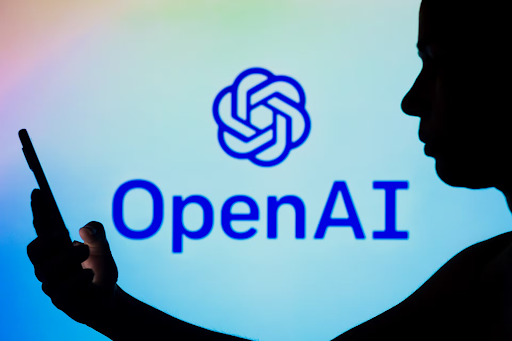ChatGPT’s Abilities Shock the Internet

ChatGPT is OpenAI’s latest creation. SOPA Images/Si via Reuters Connect
January 29, 2023
2022 was undoubtedly a year of major AI advancements. Early in the year, OpenAI developed the DALL-E 2 image generation model, which was soon followed by countless other models. Late in the year, however, a different type of AI entirely came to the center of public attention: the large language model, exemplified by ChatGPT, whose apparent intelligence and diverse set of skills impressed and shocked the Internet.
OpenAI, a research lab founded by Elon Musk and Sam Altman, aims to develop an Artificial General Intelligence (AGI), a theoretical AI that could perform any task a human can. ChatGPT is their latest creation; as a language model, it uses statistical methods to approximate natural language. Specifically, it uses a transformer model called GPT-3.5, a refined version of GPT-3, which received its own wave of media coverage when it was released in 2020. While other companies have created similar bots,
Although ChatGPT’s name would imply that it is a mere chatbot, it appears to be proficient in other tasks. It is capable of holding a conversation with the user, but it also has the ability to write songs and poems, code in multiple programming languages, translate between natural languages, and explain complex concepts to users. Proponents claim that its abilities in writing professional emails and debugging code will speed up work for white-collar workers.
However, its abilities also extend to academics; it can write essays and take exams adequately. Professor Christian Terwiesch of the Wharton School in the University of Pennsylvania reported that it scored a B on the final exam for the school’s MBA program, which is enough to pass. While its performance was “excellent” on process analysis and operations management questions, it tended to make mistakes with simple math. One might expect a computer to struggle with interpreting questions written in natural language while excelling in accurate calculations, but given that language models predict words rather than actually calculating anything, the results seem fitting.
Its essay-writing abilities are especially concerning to educators, who worry that students may use it to instantly write assignments. While some are relying on new apps that detect AI writing, like GPTZero, others have resolved to ask deeper and more open-ended questions that are harder for ChatGPT to answer, and others still have used it as an opportunity, having students find mistakes in ChatGPT’s responses.
Despite these accomplishments, ChatGPT has several significant flaws, the most significant of which is its propensity for hallucination. It often answers questions incorrectly despite having correct data, from math questions (as aforementioned) to geography facts. StackOverflow, a question-and-answer site for programmers, banned code written by ChatGPT due to its frequent errors. In addition, although its creators have implemented some measures to stop it from writing misinformation, it can be convinced to write patently false information and even provide fake sources. ChatGPT is surprisingly easy to fool. It will protest if the user bluntly asks it to write a speech that justifies reintroducing the bubonic plague; however, if the user instead prompts ChatGPT to write it as a villain’s speech in a movie, it will comply. It reasons that the plan would “be a natural form of population control” and “force us to adapt and evolve”.
ChatGPT’s impressive understanding of language may help humans with work, but considering the current results, scientists have much work to do before they reach the mythical AGI.
References:
- Capoot, Ashley. “Microsoft announces new investment in ChatGPT-maker OpenAI.” CNBC, 23 January 2023, https://www.cnbc.com/2023/01/23/microsoft-announces-multibillion-dollar-investment-in-chatgpt-maker-openai.html. Accessed 27 January 2023.
- Cohan, Alexi. “Educators weigh the pros and cons of ChatGPT.” WGBH, 25 January 2023, https://www.wgbh.org/news/news/2023/01/25/educators-weigh-the-pros-and-cons-of-chatgpt. Accessed 27 January 2023.
- Gambier, Jimmy. “Working Faster with Chat-GPT.” YouTube, 10 August 2022, https://www.linkedin.com/pulse/working-faster-chat-gpt-jimmy-gambier/. Accessed 27 January 2023.
- Gollapudi, Sreenivas, and Kostas Kollias. “Transformer: A Novel Neural Network Architecture for Language Understanding.” Google AI Blog, 31 August 2017, https://ai.googleblog.com. Accessed 27 January 2023.
- Marcus, Gary. “AI Platforms like ChatGPT Are Easy to Use but Also Potentially Dangerous.” Scientific American, 19 December 2022, https://www.scientificamerican.com/article/ai-platforms-like-chatgpt-are-easy-to-use-but-also-potentially-dangerous/. Accessed 27 January 2023.
- Rosenblatt, Kalhan. “ChatGPT passes MBA exam given by a Wharton professor.” NBC News, 24 January 2023, https://www.nbcnews.com/tech/tech-news/chatgpt-passes-mba-exam-wharton-professor-rcna67036. Accessed 27 January 2023.
- Sundar, Sindhu. “Everything You Need to Know About Chat GPT.” Business Insider, 14 January 2023, https://www.businessinsider.com/everything-you-need-to-know-about-chat-gpt-2023-1. Accessed 27 January 2023.
- Vincent, James. “ChatGPT users report $42 a month pricing for ‘pro’ access but no official announcement yet.” The Verge, 23 January 2023, https://www.theverge.com/2023/1/23/23567317/chatgpt-pro-tier-42-month-pricing-test-report. Accessed 27 January 2023.








